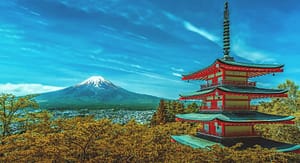Tokyo shopping has it all: high-end and offbeat fashion, traditional crafts, vintage wares, all manner of only-in-Japan souvenirs, and that gadget you didn’t know existed but now desperately want.
Whether you prefer department-store browsing or rummaging for secondhand treasures, there’s a Tokyo neighbourhood to meet your shopping needs.
Ginza is the affluent shopping district in Tokyo, home to the city’s posh boutiques and gleaming department stores, such as the classic Mitsukoshi and avant-garde Dover Street Market Ginza. There’s also the gleaming new high-fashion mall, Ginza Six But tucked in between some of the more imposing facades are simpler pleasures, like the fine crafts at Takumi, the gourmet food items at Akoymeya and the nine floors of stationery and art supplies at Itōya. Shopping options in this neighbourhood reflect the breadth and depth of the city’s consumer culture, which is equal parts high-fashion glitz and down-to-earth dedication to craft.
The Asakusa neighbourhood was once the heart of Edo’s low city, home to artisans, merchants and prostitutes. Its small lanes and winding alleyways are still full of surprises, including the vintage curios at Tokyo Hotarudo and the beautiful noren (shopfront curtains) for sale at Bengara. For straight gift shopping, Nakamise-dōri (leading up to temple Sensō-ji) is not bad for souvenir trinkets – try the back streets for better-quality stuff. Marugoto Nippon has a good collection of arts and crafts boutiques, while the long stretch of Kappabashi-dōri also yields uniquely Japanese curiosities in its little culinary-supply shops.
Once a drab warehouse district along the Sumida-gawa (Sumida River), Kuramae has been refashioned recently as the place for young artisans to set up shop. Check out Camera for leather goods (and smoothies); Maito for clothes coloured with traditional, natural dyes; and Kakimori, where you can design your own notebook and ink colour. Stroll around the district and you’re bound to find more boutiques with one-of-a-kind goods.
Just west of Shinjuku, Kōenji is a bastion of counterculture with lots of secondhand shops and kooky finds. Don’t miss the collection of fashion stores inside the ramshackle Kita-Kore Building and the coveted vintage goods at easy-to-miss Sokkyō. Travel further west on the Chūō line to hit Kichijōji, which is a popular place to trawl for homewares. Start with the boho objets at Outbound and the antique ceramics at Puku Puku.
Near Ebisu, Daikanyama is a residential enclave of cafes and boutiques, with fashion and accessories specialists such as Harcoza and Okura. Bibliophiles should head to Daikanyama T-Site. Naka-Meguro, a stroll away, is Daikanyama’s more bohemian neighbour and is home to secondhand stores and hidden lounge bars. Vase, with its vintage pieces, is among the shopping highlights here.
Shibuya is the fountain of teen trendiness in Japan. If you’re over 30 you might feel way too old here, but just cruise and amuse yourself in the madness. Music shops and cheap, outrageous apparel are everywhere, as are the hip kids who come to primp and pose. Check out the youth-focused fashion at Shibuya 109, new designers at Fake Tokyo, and don’t miss browsing the floors of homewares, gadgets and accessories at Tokyu Hands.
Southwest of Shibuya is the small neighbourhood of Shimo-Kitazawa (aka Shimokita), a favourite haunt of students and arty types, with quirky shops, restaurants and hole-in-the-wall bars. Stroll the narrow streets here to discover Tokyo’s highest concentration of vintage-clothing stores – Haight & Ashbury is among the best. Shimokita is also good for its record stores, such as Otonomad, and the mixed bag of stalls at the covered market Shimokita Garage Department.
Shopping in Shinjuku can be a little overwhelming. From the moment you step out of the train station (ringed by malls and department stores), the lights and noise make the whole neighbourhood seem like the interior of a bustling casino. But there are some great shops amid all the chaos, and Shinjuku is handy for one-stop shopping. Here you’ll find Isetan, one of Tokyo’s most revered department stores; the something-for-everyone ‘variety’ store Don Quijote; and Disk Union, where music lovers can lose a day browsing the eight storeys of secondhand vinyl and CDs. Shinjuku is also a good place for electronics if you’re not motivated to go to Akihabara.

